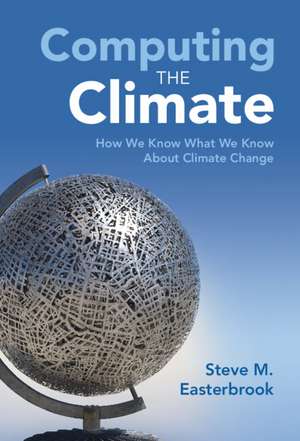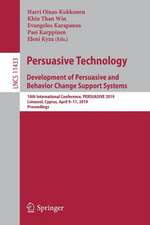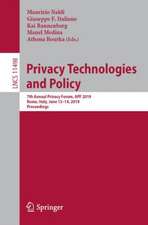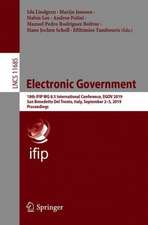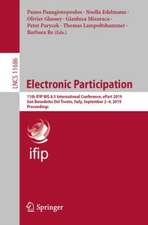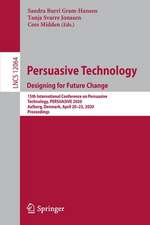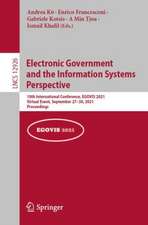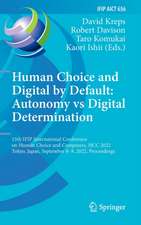Computing the Climate: How We Know What We Know About Climate Change
Autor Steve M. Easterbrooken Limba Engleză Paperback – 23 aug 2023
| Toate formatele și edițiile | Preț | Express |
|---|---|---|
| Paperback (1) | 173.57 lei 3-5 săpt. | +31.47 lei 4-10 zile |
| Cambridge University Press – 23 aug 2023 | 173.57 lei 3-5 săpt. | +31.47 lei 4-10 zile |
| Hardback (1) | 484.07 lei 6-8 săpt. | |
| Cambridge University Press – 23 aug 2023 | 484.07 lei 6-8 săpt. |
Preț: 173.57 lei
Preț vechi: 216.95 lei
-20% Nou
Puncte Express: 260
Preț estimativ în valută:
33.22€ • 34.55$ • 27.42£
33.22€ • 34.55$ • 27.42£
Carte disponibilă
Livrare economică 25 martie-08 aprilie
Livrare express 08-14 martie pentru 41.46 lei
Preluare comenzi: 021 569.72.76
Specificații
ISBN-13: 9781107589926
ISBN-10: 1107589924
Pagini: 350
Dimensiuni: 229 x 152 x 21 mm
Greutate: 0.56 kg
Editura: Cambridge University Press
Colecția Cambridge University Press
Locul publicării:New York, United States
ISBN-10: 1107589924
Pagini: 350
Dimensiuni: 229 x 152 x 21 mm
Greutate: 0.56 kg
Editura: Cambridge University Press
Colecția Cambridge University Press
Locul publicării:New York, United States
Cuprins
1. Introduction; 2. The world's first climate model; 3. The forecast factory; 4. Taming chaos; 5. The heart of the machine; 6. The well-equipped physics lab; 7. Plug and play; 8. Sound science; 9. Choosing a future; References; Index.
Recenzii
'Numerical climate models are a critical tool for assessing the threat posed by climate change and investigating the options available to mitigate that threat. Yet, an understanding of these models-how they work, what they tell us, and how their tested and validated-has remained evasive for all but the most math and physics-literate. In Computing the Climate, computer scientist Steve Easterbook takes us on a journey through the world of climate modeling, making the science accessible to lay readers, and showing us why we should trust the models and heed their warnings, before it's too late.' Michael Mann, University of Pennsylvania, author of The New Climate War
'Computing the Climate provides an impressively detailed history of how climate models evolved from simple equations calculated by hand to giant programs running on supercomputers. Avoiding jargon, this book explains to a general audience how the laws of physics and the principles of software engineering are combined to build climate models.' R. Saravanan, Texas A&M University, author of The Climate Demon
'Computing the Climate takes a unique look at the history of computational modeling the Earth's climate system, the processes represented in these models, their evaluation, and how they are being used to project the potential changes in the future of our climate. When combined with more detailed analyses of concurrent issues being addressed in these models such as cloud and convection processes, this would be an excellent book for a university course on climate modeling.' Don Wuebbles, University of Illinois
'I teach several courses in climate change and climate modeling for general and specialized audiences, and I am so excited to incorporate this new text by Easterbrook into those classes. While climate models are derived from first physical principles, climate models are developed by people and communities. I think that this book's approach of the tracing of revolutionary ideas and herculean efforts by generations of scientists to develop deep understanding and predictive capability for weather and climate does the topic justice. The logical progression of concepts, chapter by chapter is excellent as is the extensive, but not obtrusive, referencing throughout. Many difficult concepts, including: the greenhouse effect, chaos and predicability, computational instability, parallel computing, the difference between predictions and projections, are explained very well and accessibly. This book will be compelling reading both for students and people who simply want to know more.' Matthew Huber, Purdue University
'Easterbrook's non-technical survey of climate modeling uniquely expands the climate change genre. Students will benefit from its broad scope and equation-free conceptual explanations, and climate modelers will appreciate its historical approach linking nineteenth century experiments and ideas to twenty-first century breakthroughs.' Baylor Fox-Kemper, Brown University
'This is a very readable personal account of climate model development throughout history. It focuses on several individuals and modeling groups/countries. It often refers to 'you' and 'we'. I learned a lot and enjoyed the book, and I recommend it to anyone faced with making decisions involving the future climate.' Kevin Trenberth, University of Auckland, author of The Changing Flow of Energy Through the Climate System
'This engaging, beautifully written book brings alive the scientists who created climate models, how they did it, and what the models can (and cannot) tell us - all in straightforward, nontechnical language and enlightening illustrations. If you want to understand how modern climate science works, start here.' Paul N. Edwards, Stanford University, author of A Vast Machine: Computer Models, Climate Data, and the Politics of Global Warming
'Computing the Climate provides an impressively detailed history of how climate models evolved from simple equations calculated by hand to giant programs running on supercomputers. Avoiding jargon, this book explains to a general audience how the laws of physics and the principles of software engineering are combined to build climate models.' R. Saravanan, Texas A&M University, author of The Climate Demon
'Computing the Climate takes a unique look at the history of computational modeling the Earth's climate system, the processes represented in these models, their evaluation, and how they are being used to project the potential changes in the future of our climate. When combined with more detailed analyses of concurrent issues being addressed in these models such as cloud and convection processes, this would be an excellent book for a university course on climate modeling.' Don Wuebbles, University of Illinois
'I teach several courses in climate change and climate modeling for general and specialized audiences, and I am so excited to incorporate this new text by Easterbrook into those classes. While climate models are derived from first physical principles, climate models are developed by people and communities. I think that this book's approach of the tracing of revolutionary ideas and herculean efforts by generations of scientists to develop deep understanding and predictive capability for weather and climate does the topic justice. The logical progression of concepts, chapter by chapter is excellent as is the extensive, but not obtrusive, referencing throughout. Many difficult concepts, including: the greenhouse effect, chaos and predicability, computational instability, parallel computing, the difference between predictions and projections, are explained very well and accessibly. This book will be compelling reading both for students and people who simply want to know more.' Matthew Huber, Purdue University
'Easterbrook's non-technical survey of climate modeling uniquely expands the climate change genre. Students will benefit from its broad scope and equation-free conceptual explanations, and climate modelers will appreciate its historical approach linking nineteenth century experiments and ideas to twenty-first century breakthroughs.' Baylor Fox-Kemper, Brown University
'This is a very readable personal account of climate model development throughout history. It focuses on several individuals and modeling groups/countries. It often refers to 'you' and 'we'. I learned a lot and enjoyed the book, and I recommend it to anyone faced with making decisions involving the future climate.' Kevin Trenberth, University of Auckland, author of The Changing Flow of Energy Through the Climate System
'This engaging, beautifully written book brings alive the scientists who created climate models, how they did it, and what the models can (and cannot) tell us - all in straightforward, nontechnical language and enlightening illustrations. If you want to understand how modern climate science works, start here.' Paul N. Edwards, Stanford University, author of A Vast Machine: Computer Models, Climate Data, and the Politics of Global Warming
Notă biografică
Descriere
Accurate climate models have existed since the 1800s. Learn how these models have developed – and why we should believe them.
